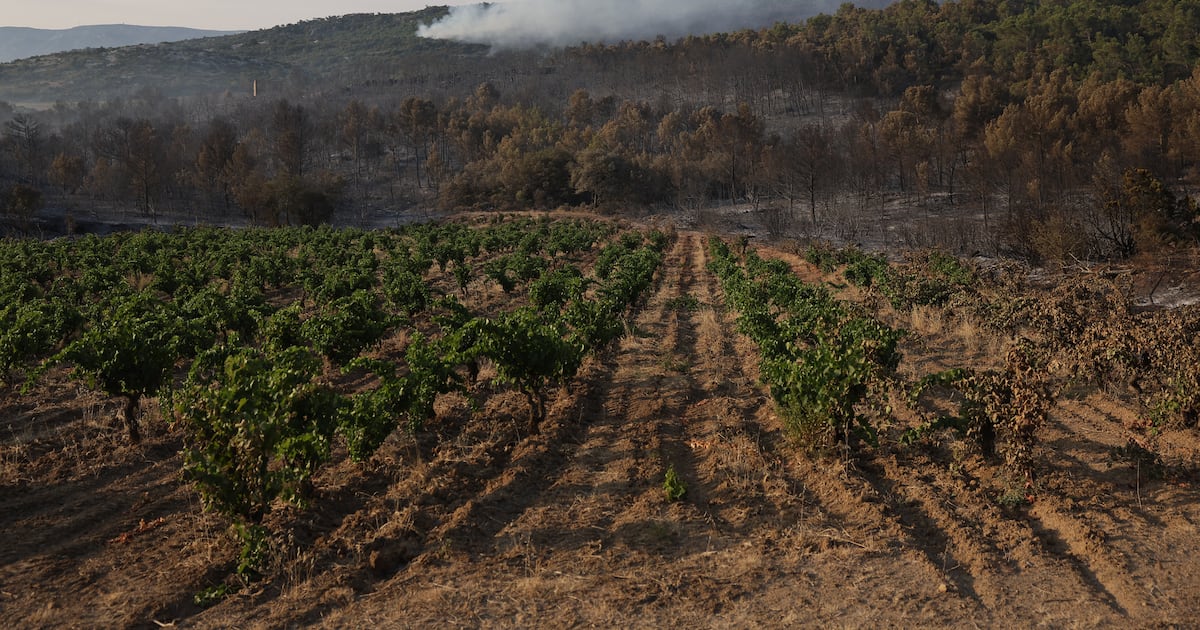World
France Faces Major Wildfire Crisis as Vineyards Disappear

A severe wildfire has engulfed the southern region of Aude in France, marking the largest blaze the country has seen since 1949. This devastating fire has consumed an area greater than that of Paris, leading to one confirmed fatality and prompting a massive response from approximately 2,000 firefighters battling the flames, which have been fueled by strong winds and dry vegetation.
The loss of nearly 5,000 hectares of vineyards in Aude over the past year has exacerbated the wildfire crisis, as these vines traditionally served as a natural barrier against fires. Farmers, facing declining wine consumption and state incentives, have been uprooting their vines, inadvertently removing this critical fire break.
Impact of the Wildfire on Local Agriculture
During a visit to the fire-stricken area, François Bayrou, the French Prime Minister, emphasized the stark correlation between vineyard loss and the fire’s rapid spread. “It’s very striking that everywhere where there were vineyards, the fire was for the most part stopped,” he noted. While some vineyards have been scorched, many others remain intact, albeit with their grapes destroyed.
Local winemaker Baptiste Cabal, whose family cultivates vines in the heart of the blaze, expressed concern over the trend of uprooting vineyards. He highlighted that fallow lands often become overrun with scrub and brush, increasing fire risk. “Less idle land and more vines would be much better,” Cabal stated.
Aude, part of the historic Corbières wine belt, has experienced a significant decline in vineyard acreage, losing about 7% this year alone. The French government is offering farmers €4,000 euros per hectare to remove their vines as part of a strategy to reduce wine production amid changing drinking habits. Despite this, growers argue that alternatives such as olives and pistachios are unsuitable for the region’s dry conditions, especially as sheep farming has largely disappeared.
Climate Change and Long-Term Consequences
The situation is compounded by climate change, which has caused Europe to warm at twice the global average rate. Aude has faced a drought for three consecutive years, making it increasingly difficult for local growers to maintain their crops. According to Ludovic Roux, president of Aude’s chamber of agriculture, “Nothing has been able to replace vines. Vines are the last barrier against fires.”
The recent wildfire has destroyed working vineyards, and grapes from other plots are at risk due to contamination from fire-retardant chemicals and smoke damage. Cabal predicts a “catastrophic” harvest, estimating that at least half of his family’s vines have suffered damage.
Local farmers are increasingly anxious about their ability to recover from this disaster without substantial government assistance. Jerome Despey, a grower in the neighbouring Hérault region and vice-president of the FNSEA farmers union, stressed the need for diversification in crop production but underscored the importance of preserving existing vineyards that are well-suited to the Mediterranean climate.
As the wildfire crisis continues, the future of Aude’s vineyards and the livelihoods of its farmers hang in the balance, raising urgent questions about agricultural sustainability and climate resilience in a warming world.
-

 Entertainment1 week ago
Entertainment1 week agoAimee Osbourne Joins Family for Emotional Tribute to Ozzy
-

 Politics2 weeks ago
Politics2 weeks agoDanny Healy-Rae Considers Complaint After Altercation with Garda
-

 Top Stories3 weeks ago
Top Stories3 weeks agoFianna Fáil TDs Urgently Consider Maire Geoghegan-Quinn for Presidency
-

 World3 weeks ago
World3 weeks agoHawaii Commemorates 80 Years Since Hiroshima Bombing with Ceremony
-

 World3 weeks ago
World3 weeks agoGaza Aid Distribution Tragedy: 20 Killed Amid Ongoing Violence
-

 World3 weeks ago
World3 weeks agoCouple Convicted of Murdering Two-Year-Old Grandson in Wales
-

 Top Stories3 weeks ago
Top Stories3 weeks agoClashes Erupt Between Far-Right Groups and Migrants in Spain
-

 Top Stories3 weeks ago
Top Stories3 weeks agoHistoric Dalkey Pub The Queens Reopens Under New Management
-

 World3 weeks ago
World3 weeks agoAristocrat Constance Marten and Partner Convicted of Infant Murder
-

 World3 weeks ago
World3 weeks agoTrump Defends FBI Deputy Director Amid Epstein Files Controversy
-

 Business3 weeks ago
Business3 weeks agoSunshine 106.8 Boosts Irish Music After Regulator’s Request
-

 Politics3 weeks ago
Politics3 weeks agoTragic Crowd Surge at Gaza Aid Center Claims 20 Lives









